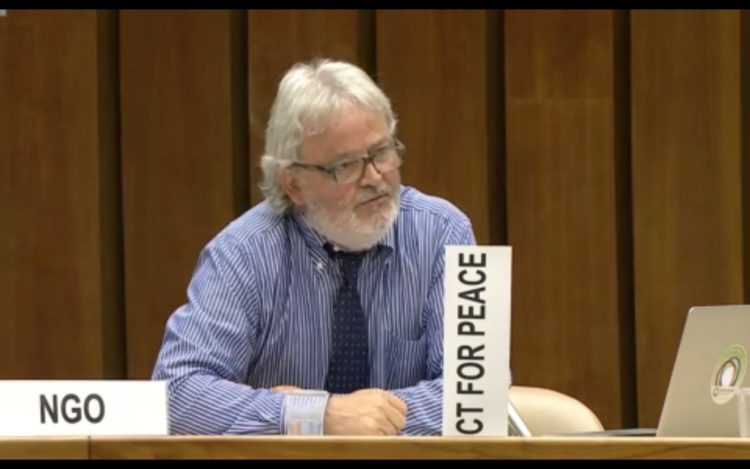
ICT4Peace’s Daniel Stauffacher was invited on 4 and 5 May 2015 to address the United Nations member states in Geneva, where he called again for the Use of Information and Communication Technologies (ICTs) for peaceful purposes. In particular, he stressed that ICTs be used to improve early warning of potential conflicts, mitigate their impact, and promote reconciliation and non-violent means of resolving disputes between and within nations. He warned that ICTs are increasingly being used for purposes detrimental to peace and security, including attacks on digital networks and systems. Noting that traditional and social media can be used to promote disharmony and conflict between social, political and ethnic groups, Stauffacher demanded that norms of responsible behaviour and confidence building measures (CBMs) for cyberspace be urgently developed by the world community. His presentation can be found here. (see from 8:46 to 13:27 minutes).
During his presentation Stauffacher reminded the audience that the United Nations Millenium Declaration of 2000, in its first paragraphs, addresses the issues of peace, security and disarmament, along with economic and social development and poverty eradication as its overarching goals. Therefore, and similar to the important achievements in using ICTs for Development, the international community should pay more attention to emerging ICT tools which can be used to support actors working in peace operations, peace building, humanitarian response and the protection of fundamental rights.
He also recalled that in 2005, the World Summit on the Information Society (WSIS) adopted the Tunis Committment, including paragraph 36, (which was introduced by Switzerland and Tunisia with the support of many countries) (Footnote 1), which reads:
36. We value the potential of ICTs to promote peace and to prevent conflict which, inter alia, negatively affects achieving development goals. ICTs can be used for identifying conflict situations through early-warning systems preventing conflicts, promoting their peaceful resolution, supporting humanitarian action, including protection of civilians in armed conflicts, facilitating peacekeeping missions, and assisting post conflict peace-building and reconstruction.
Daniel Stauffacher then thanked the authors of the report of WSIS+10 Statement on the Implementation of WSIS Outcomes for including reference to this important paragraph 36 of the WSIS Tunis Committment in its preamble. WSIS+10 Statement on the Implementation of WSIS Outcomes which reads as follows:
Preamble
World Summit on the Information Society — WSIS+10
Ten years ago, at the World Summit on the Information Society (WSIS) in its two phases (Geneva 2003, & Tunis 2005), the representatives of the peoples of the world adopted a common vision on the Information Society, identifying its main principles and challenges towards a people-centered inclusive and development-oriented Information Society. The fundamental aim of the WSIS process was to foster the use of technology to improve peoples’ lives and to bridge the digital divide.
The uses of ICTs have developed considerably and become a part of everyday life since the second phase of the WSIS in 2005, accelerating social and economic growth, sustainable development, increasing transparency and accountability, where applicable, and offering new opportunities to leverage technology, in developed and developing countries.
Information and communication technologies (ICTs) have also demonstrated their value as a facilitator and development enabler in reaching the Millennium Development Goals (MDGs). However, major challenges still lie ahead for counteracting the wide disparities in development and enabling all groups and all countries to benefit from universal access to information and knowledge. Moreover reaping the benefit of ICTs’ use has yet not been shared in all countries proportionately. In particular we reaffirm para. 36 of the Tunis Commitment regarding the potential of ICTs to promote peace and to prevent conflict.
Stauffacher thanked the Secretariat of the Commission on Science and Technology for Development for an excellent description of the challenges and achievements in the context of para. 36 of WSIS 2005 Tunis Commitment in their report Implementing WSIS Outcomes – A ten Year Review (see page 27). In concluding, he reiterated ICT4Peace’s commitment to the development of ICTs for peace and security and an open, free and secure cyberspace. He invited UN member states to reaffirm para. 36 of the Tunis Commitment regarding the potential of ICTs to promote peace and to prevent conflict.
For more information on the first phase of the World Summit on the Information Society in 2003 in Geneva please also refer to the following publication.
Footnote 1 Para. 36 of the Tunis Committment was prepared on the basis of the Report ICT4Peace: Role of ICT in Preventing, Responding to and Recovering from Conflict produced by an ICT4Peace project supported by the Swiss Government and lead by Daniel Stauffacher, then Swiss Ambassador for the WSIS.
Footnote 2 Information on the work of the ICT4Peace Foundation can be found here, here and here.
